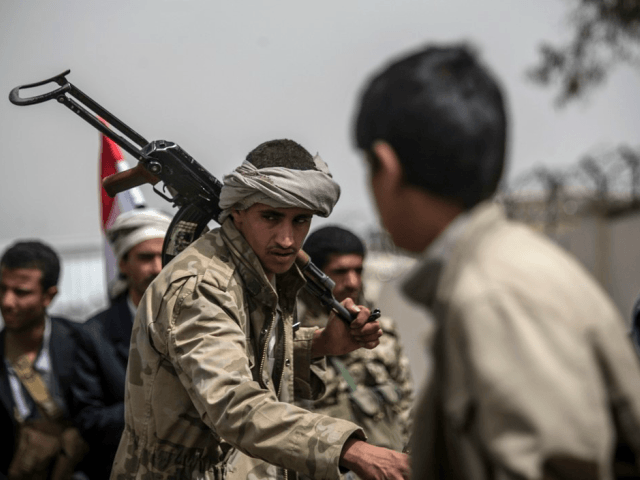Iran-allied Shiite Houthi rebels fighting against the Saudi- and Emirati-backed government in Yemen have repeatedly committed atrocities that may amount to “war crimes” including torture and enforced disappearances, Human Rights Watch (HRW) reported on Tuesday.
Sarah Leah Whitson, the Middle East director at HRW, declared:
The Houthis have added profiteering to their long list of abuses and offenses against the people under their control in Yemen. Rather than treat detainees humanely, some Houthi officials are exploiting their power to turn a profit through detention, torture, and murder.”
Yemenis taken into custody are suffering terribly, whether at the hands of the Houthis, the UAE [United Arab Emirates] forces, or government forces. UN officials and influential governments should press the warring parties to treat detainees humanely and release anyone being held arbitrarily.
The watchdog urged the United Nations Human Rights Council to renew the mandate of the Group of Eminent Experts on Yemen that investigates human rights violations in the country, acknowledging that parties on both sides of the conflict are committing human rights atrocities with impunity.
Citing the Association of Mothers of Abductees, HRW documented at least ten cases in which the Shiite Houthi rebels demanded money as a condition for the release of hostages.
“Nine families paid. Houthi officials released only three of the men, including one in a prisoner exchange for Houthi fighters,” the watchdog group noted.
In a statement issued on Tuesday, the New York-based watchdog group explicitly accused the Shiite militants of committing “serious abuses” against people they hold in detention, adding that the arbitrary detentions, torture, and enforced disappearances “go unpunished.”
“Human Rights Watch documented 16 cases in which Houthi authorities held people unlawfully, in large part to extort money from relatives or to exchange them for people held by opposing forces. Hostage-taking is a serious violation of the laws of war and a war crime,” HRW stated.
Human Rights Watch learned from unnamed former detainees that Houthi insurgents beat their hostages with “iron rods, wooden sticks, and assault rifles.”
The watchdog added:
Guards whipped prisoners, shackled them to walls, caned their feet, and threatened to rape them or their family members, former detainees said. Several people described being hung from a wall by their arms shackled behind them as one of the most painful techniques. In many cases, Houthi officials tortured them to obtain information or confessions.
Echoing an assessment conducted by a group of United Nations experts on Yemen, HRW pointed out that the abuses committed by the Houthis amount to “war crimes,” explaining:
When committed in the context of an armed conflict, cruel treatment, torture, and humiliating or degrading treatment are war crimes. Taking hostages – seizing someone or detaining them and threatening to kill, injure, or continue to detain them to compel a third party to do or abstain from doing something as a condition of release or for the person’s safety – is a war crime under the statute of the International Criminal Court.
The U.N. experts determined this year that the Houthis had “committed acts that may amount to war crimes, including cruel treatment and torture [and] outrages upon personal dignity,” HRW reported.
Despite the continuing airstrikes, a naval blockade by Saudi-led coalition forces, and the efforts of anti-Houthi fighters on the ground in Yemen, the Iran-backed Shiite militants control swathes of territory in the northern part of the country, in and around the capital of Sanaa.
Houthi rebels refused to provide medical aid after the abuse, the former detainees proclaimed, adding that many of the prisoners suffered physical and psychological trauma from the mistreatment.
Former prisoners also described horrible conditions at the Houthi detention facilities, including “poor hygiene; limited access to toilets, causing some to defecate on themselves; and lack of food and health care.”
The sister of a former prisoner told HRW, “He is not as he used to be. Signs of psychological disturbance appeared on him, he talks to himself, sometimes he keeps saying ‘Why do they beat me?’, talking to himself. I don’t know what he saw, or what they did to him, during his disappearance.”
Once taken into custody, detainees are unable to challenge their imprisonment or report abuses. Houthi militants house their detainees in formal and informal facilities, according to HRW.
The civil war in Yemen has been raging since March 2015. According to the U.N., the conflict has resulted in at least 16,000 fatalities.
Yemen, the Arab world’s poorest country, is home to the “world’s worst humanitarian crisis” driven by hunger and disease stemming from the war.

COMMENTS
Please let us know if you're having issues with commenting.